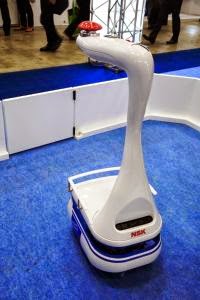NSK Ltd recently demonstrated a prototype of a robot that guides a
person through obstacles at the “Robotics Demo Corner” of
Techno-Frontier 2014 in Tokyo.
The robot, “Lighbot,” helps visually impaired people move in, for
example, hospitals and commercial facilities. When the user walks while
holding the handle of the robot, it recognizes walls and obstacles
around it and guides the user to the destination through obstacles. In a
sense, it is a wise autonomous car for the elderly.
A four-axis optical force sensor developed by NSK is embedded in the
handle. When the user tilts the handle to the desired direction, the
robot starts to move in the direction.
The lower half of the robot’s body incorporates a laser range sensor
that recognizes walls around it and a range image sensor that detects
obstacles located as high as the user’s eye level. When the robot is
about to hit a wall or obstacle, it automatically changes its direction
of movement. For the range image sensor, ASUSTeK Computer Inc’s “Xtion
Pro Live” motion capture device for personal computers is used.
On the front of the robot’s undersurface, there is an infrared range
sensor. Therefore, the robot can detect a large height difference in its
direction of movement such as a step and avoid it.
Moreover, the robot has a navigation function. It estimates its
location based on the traveled distance and a registered map. When the
user selects a destination from pre-registered locations by pressing
buttons, the robot automatically calculates a route from the current
location to the destination and guides the user to the destination with
voice.
The robot has one front wheel and two rear wheels, which are driving
wheels independent from each other. It measures 360 (W) x 450 (D) x
1,050 (H) and weighs 15kg. NSK has been testing the robot at Kanagawa
Rehabilitation Center since January 2014 and will continue the test.
















0 comments:
Post a Comment